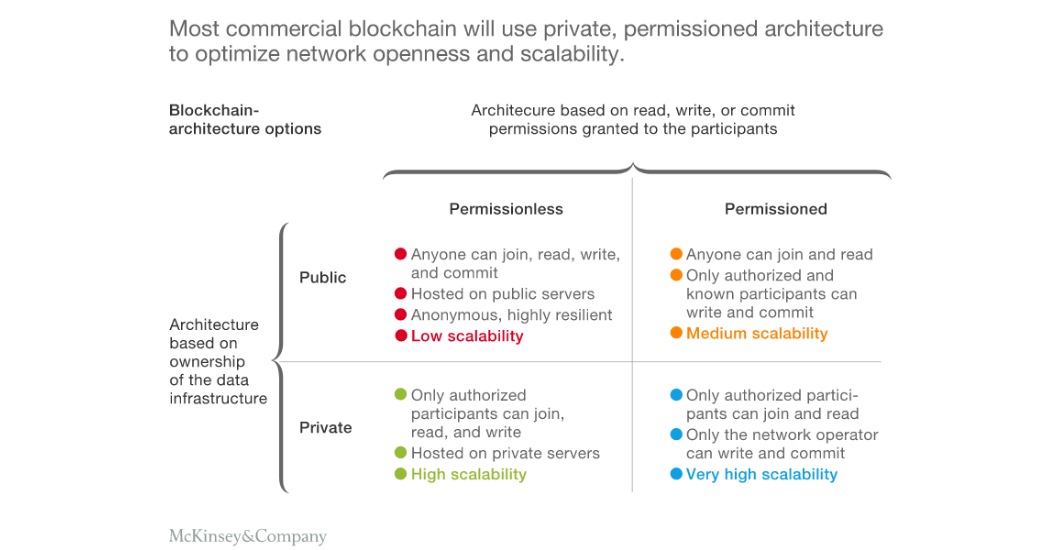-
In this blog, we will firstly focus on the distinction between permissioned and permissionless blockchains. Then, we explore the increasing importance of permissioned blockchain app development for enterprises. There has been a steep rise in the popularity of blockchain technology in the past few years. Both public and private organizations are implementing various blockchain ventures. Blockchain is an evolving technology. It is still in its early stages. Thus, there are misunderstandings in the blockchain industry as well. One of the fundamental confusions is choosing the right type of blockchain technology, either permissioned or public blockchains.
Understanding Permissioned and Permissionless Blockchains
Before using a permissioned blockchain, a licensed blockchain requires prior approval. On the other hand, a permissionless blockchain enables anyone to participate in the framework. Although the two systems can sound identical, we cannot use them for the same things. In various cases, one of the disadvantages of crypto is that no one has power over it. People might not be keen on using a licensed cryptocurrency. For instance, Maersk would not want to store its sensitive information related to shipping and logistics on a blockchain without permission.
What are the Similarities
These are both distributed ledgers. It implies that several copies of the same data would be stored in various locations and linked through some network. Theoretically, all of these blockchains are permanent. It means that that the information they record, no entity can change or delete it. And if someone tries to gain charge, the blocks connected with cryptographic hashes also change. Both make use of structures for consensus. It means they have a way to agree with business rules or transaction verification.
 Source Mckinsey&Company
Source Mckinsey&Company Considerations for Opting the Right Method
When it comes to data access and control permissions, public blockchains provide far greater access to data but less control over who can see and access it. For addressing data privacy and security-related challenges, public blockchain use methods like encryption and hashing. Access to private blockchain deployments focuses on permissions. Also, data chunks remain separated as per needs cases. Participants store and access data for transactions only for which they have authority. Permissioned blockchains benefit when system efficiency is crucial because there are fewer participants to come to a consensus. Today, public blockchains are more interoperable than private ones, the WEF argues. That's theoretically real. At the same time, private blockchains strive to establish common standards, it states. Our experts argue that those shared standards are industry-focused. It can trump the public blockchain's generic interoperability. In practice, the creation of common standards often depends on enterprise blockchain solutions. These standards can be more useful than the implementation of the blockchain itself.
Building Business Solutions with Permissioned Blockchain Infrastructure
Private blockchain development means using a distributed transaction ledger that is private. It registers and replicates transactions through permissioned nodes in real-time without publicly presenting the data. Permissioned blockchains enable a network' to operate by only a few individuals. Additionally, it gives them the right to override/delete commands on the blockchain. As a result, they will have their information only for the participating organizations, and the others will not be able to use it. The time, effort, and resources required to achieve a consensus are relatively low. Thus, it leads to cost-effective and efficient transactions. The key advantages and functionality of a private blockchain are identical to a public blockchain; however, an invitation to access the system must be issued, checked by a network validator, and managed by the central consortium. Oodles provides you a unique opportunity to create a highly appropriate and efficient framework that meets your business goals and enables users to access and function as authorized only with your invitation, allowing a regulated transaction system. Also, Read | How Private Blockchain Solutions Reinforce Your Business Processes
Features
- Requires private sales
- The management authority gets the authority to override
- Partially autonomous control
- Consensus of multi-parties
- Immutable in section
- Secures confidential data
Advantages
The enormous importance of private blockchain development is commendable for developing business processes. The solutions and tools potentially help to minimize mistakes and fraud. Not just that, with the following advantages, it astounds its users.
- There are few private blockchains, which take less time for the network to reach a consensus and significantly speed up the process
- Only a few nodes handle data. It helps in increasing the decision-making process while enabling scalability
- Exerts control over participants due to limited and restricted access
- Moves data and files very effectively
- Possesses security features that allow transactions at low risk
- Highly adjustable according to business needs
Real-World Example
A SWIFT message is now an established way of sharing and passing on transactions. No entity can delete such a SWIFT message until all parties have screened, checked, and validated the information. That's costly and time-consuming. With a blockchain system, permissioned authorities can authenticate and sign a SWIFT transaction in real-time at the same time. Blockchain enables the use of smart contracts for businesses. It reduces the number of intermediary parties significantly, thus lowering costs. Private blockchain also helps to eliminate centralized databases that are more vulnerable to attacks than those usually decentralized by blockchain technology. Finally, permissioned blockchain development does not use proof-of-work, which for businesses is expensive and unnecessary. They use consensus with extensive use of cryptographic security and PKI. It may seem paradoxical that the same banks use a technology designed to replace banks. They are doing so to enforce the security of their systems and improve their profitability. But, it also reveals, on the other hand, how the technology works and that we can exploit it in various industries. In reality, it means that businesses can remain competitive by adapting to the blockchain ecosystem.
Conclusion
The purpose of this article was to define and illustrate why permissioned blockchain development is beneficial for businesses with enterprise-level needs. Indeed, permissioned blockchains can provide them with appropriate identification and permission to access the network, consensus mechanisms depend primarily on PKI (Public Key Infrastructure), various advantages of public blockchains, and a high ability to save significant amounts of time and costs in transactions and operations. Connect with our blockchain development experts for more information about blockchain permissioned app development.

Our Offices
INDIA
Emaar Digital Greens, Sector 61,
Gurugram, Haryana
122011.
Welldone Tech Park,
Sector 48, Sohna road,
Gurugram, Haryana
122018.














